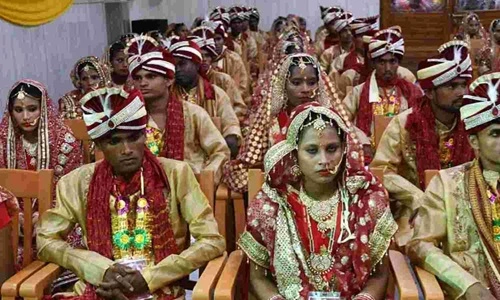Yes, inter-caste marriage is completely legal in India. The Constitution of India and various laws, including the Special Marriage Act, 1954, uphold the right of individuals to marry someone of their choice, irrespective of caste or religion. However, societal and cultural resistance still poses challenges for couples opting for inter-caste marriages, despite legal protection.
Legal Framework for Inter-Caste Marriages in India

- Special Marriage Act, 1954
- The Special Marriage Act provides a legal framework for solemnizing marriages between individuals of different castes or religions.
- It requires no religious formalities and is based purely on civil procedures.
- Key Requirements:
- Both individuals must be of marriageable age (21 for men and 18 for women).
- A 30-day public notice is issued by the marriage officer, allowing objections to the marriage on legal grounds.
- The marriage is solemnized in the presence of witnesses.
- Hindu Marriage Act, 1955
- This Act governs marriages between two Hindus, including those from different castes. Inter-caste marriages are valid under this Act if both individuals are Hindu by religion.
- The Act ensures that caste differences do not invalidate a marriage.
- Protection Under the Constitution of India
- Article 14: Guarantees equality before the law, prohibiting discrimination based on caste.
- Article 15(1): Prohibits discrimination on the grounds of religion, race, caste, sex, or place of birth.
- Article 21: The right to marry a person of one’s choice is protected as part of the right to life and personal liberty.
Government Incentives for Inter-Caste Marriages
To encourage inter-caste marriages and reduce caste-based discrimination, the government has introduced financial incentives:
- Dr. Ambedkar Scheme for Social Integration Through Inter-Caste Marriages
- Offered by the Ministry of Social Justice and Empowerment, this scheme provides financial assistance to couples where one partner belongs to a Scheduled Caste (SC).
- Eligibility Criteria:
- The marriage must be registered under the Special Marriage Act.
- At least one spouse must belong to an SC community.
- Couples receive up to ₹2.5 lakh as an incentive.
- State-Specific Incentives
- Several states, including Tamil Nadu, Maharashtra, and Karnataka, offer additional financial support for inter-caste marriages.
Challenges and Realities
Despite legal protection, inter-caste marriages in India often face societal opposition and challenges, including:
- Family and Social Resistance
- Many families oppose inter-caste marriages due to traditional beliefs and the stigma attached to caste hierarchies.
- Couples often face ostracism or threats from their families or communities.
- Honor-Based Violence
- In extreme cases, inter-caste marriages have led to honor killings, where families resort to violence to “protect” their social reputation.
- To address this, the Supreme Court has directed state governments to take strict action against such incidents.
- Khap Panchayats
- These self-styled community councils in certain regions, especially in North India, have issued illegal diktats against inter-caste couples, leading to harassment or violence.
- Relocation for Safety
- Many inter-caste couples are forced to relocate to urban areas or seek police protection to escape societal pressure.
Judicial Support for Inter-Caste Marriages
Indian courts have consistently upheld the legality of inter-caste marriages and provided protection to couples.
- Lata Singh v. State of Uttar Pradesh (2006)
- The Supreme Court ruled that adults have the right to marry anyone of their choice.
- It emphasized that inter-caste marriages are a step toward eradicating casteism and must be encouraged.
- Shakti Vahini v. Union of India (2018)
- The Supreme Court directed the government to take measures to prevent honor killings and protect couples facing threats due to inter-caste marriages.
- It declared that no third party, including family or community, has the authority to interfere in the decisions of adult individuals regarding marriage.
Steps to Register an Inter-Caste Marriage
- Under the Special Marriage Act:
- Submit a notice of intended marriage to the Marriage Registrar in your jurisdiction.
- The Registrar will display the notice publicly for 30 days.
- If no valid objections are raised, the marriage will be registered in the presence of three witnesses.
- Under the Hindu Marriage Act:
- Conduct the marriage as per Hindu rituals.
- Register the marriage with the local registrar.
Protection for Inter-Caste Couples
Couples facing threats or harassment can seek legal remedies and protection:
- Police Protection
- Approach local police or file a complaint with the Women’s Commission for safety.
- Safe Houses
- Several states, including Haryana and Punjab, have established safe houses for couples facing threats due to inter-caste marriages.
- Legal Assistance
- Couples can file a writ petition in the High Court for protection under Article 21.
Conclusion
Inter-caste marriages are legal in India and supported by the Constitution and laws like the Special Marriage Act. However, societal and cultural challenges often hinder couples from exercising this right freely. The government and judiciary are actively working to encourage inter-caste marriages and provide protection to those facing discrimination. While legal barriers have been eliminated, continued efforts are needed to change societal attitudes and ensure that every individual can marry the partner of their choice without fear.
Hina Abbasi is Editor and a passionate sports and entertainment content writer at WinnersMaze.com. Hina’s expertise spans across a wide range of sports, and interest in many TV shows allowing her to deliver insightful analysis and compelling stories that resonate with readers.

